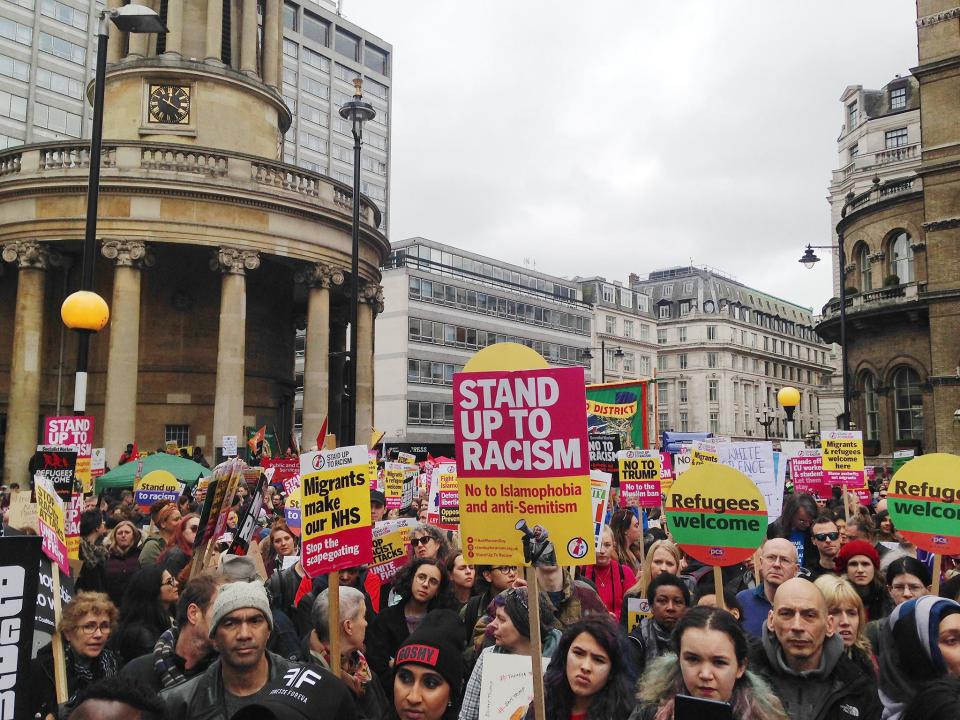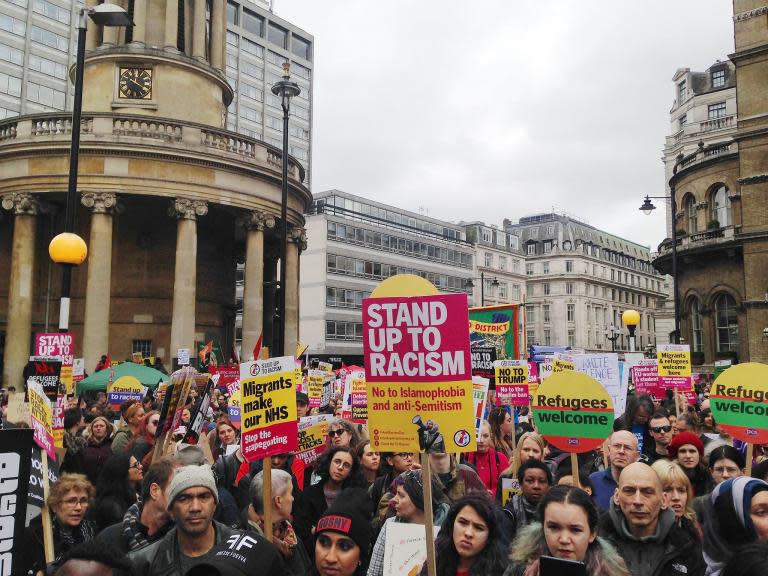The racial abuse I experienced the day after Brexit forced me to realise that I wasn’t white
A year ago I sat down at a bar in South Kensington to enjoy a drink with my brother. As is British custom for a bright sunny day in June, we sat outside in order to maximize our exposure to the sun. We saw a man across the road, wearing a baggy hoody and jeans, topped off with a cap. He seemed drunk. Slowly, he ambled over to our table, and turned to face us.
“Look,” he said, “I don’t care if you’re here to be a doctor, or a lawyer, or whatever, just go back and do it in your own country.
“You’re not true British, you’ll never be true British. We voted out to all you lot, so now you have to leave.”
It was the middle of the afternoon, in a crowded bar, and this man had approached us completely unprovoked. Of course, I’d experienced racism before, but never so bold and smug as this. What could possibly have made this man feel that he had the right to approach us, in the cold light of day, and tell us we didn’t belong in the country that we call home?
It was the day after the EU referendum, and the UK had just voted to leave the EU.
I went home and created my first Twitter account, and shared my story with the hashtag #PostRefRacism. The campaign snowballed, and hundreds of people reached out to Post Ref Racism with horrific personal accounts of abusive incidents. The hashtag was used 56,089 times in the 10 days following the referendum, and #PostRefRacism appeared in hundreds of articles spanning every continent. I even appeared on the BBC’s London evening news, scrolling through the Post Ref Racism Twitter feed on the interviewer’s phone because my own phone screen was smashed. It was crazy. The campaign had tapped into something real that people were feeling at the time – that I was feeling at the time: an eruption of frustration at being made a stranger in the place I called home.
Just like that, an incident of hate one year ago sent me unwittingly on the path to becoming a race-equality campaigner; that drunk man in a baggy hoody honestly changed my life.
Before the referendum I thought I was white. Don’t misunderstand me – I didn’t think I had white skin, but I thought, skin aside, that inside I was as white as any of my white-middle-class peers. I was born in the Royal Gwent Hospital, I had lived in the UK for my entire life, I watched Blue Peter and ate Sunday roasts. I would jump to tell people that I’d never even been to Bangladesh or Guyana, the countries where my parents were born, and that my parents hadn’t been back since moving to the UK as children. I didn’t speak Bengali, or Hindi, and no of course I wasn’t Muslim and my family only ate curry at home very occasionally. I left every stereotype unchallenged because I thought it didn’t apply to me – that I was different to other brown people. In my mind, I was as British as British could be.
Yet people would ask me, again and again, “but where are you really from?” And I would get increasingly exasperated. Try as I might to dissociate myself from any relic of my South Asian heritage, my skin would give me away. “I’m as British as you,” I would plead, “I don’t even like Bangladeshi culture, it’s oppressive and I want nothing to do with it.” I hated the fact that people could strip me of my connection with my country with that one short question, and so I sought to validate my claim on the UK by rejecting, even degrading, the other cultures in my life. Without realising, I was propagating the idea of British cultural supremacy to justify my own British-ness.
Pretending to be white was a game I learned early from my parents. My parents worked incredibly hard to achieve the middle-class status they have today. My dad grew up in Tooting with his five siblings and my grandparents, who ran a hardware shop. He went to the local school where he was the subject of violent racist bullying every day, but where he was also the first person ever to get straight As in four A-levels. He chose to be an actuary because “if you pass the exams, then no one can hold you back” – he calculated that discrimination could not bias the advancement prospects in this profession. Despite that, he was passed over three times for promotions that he should have received. After a lot of pain and sweat and frustration, he is now the only brown face on the senior management team of a top-tier insurance company. I have the utmost respect and admiration for his incredible achievement.
But he didn’t get there by kicking up a fuss and calling out the institutional racism that held him back. He got there by pretending to be white – by joining the golf club, and talking about pleasantries. By biting his tongue and putting on a smile for his white friends. By telling white people what they wanted to hear: that racism is a thing of the past and that we’ve come so far. All you can do is accept the system that held you down and hope that other black and brown folk are dogged enough to struggle up behind you. My father’s story is testament to the fact that if you want success in a white man’s world, you have to pay the piper.
For me, the referendum changed everything, and nothing. Racism wasn’t new – sure it was bolder and more widespread, it was on the TV and in the newspaper and coming out of Theresa May’s mouth – but it was the same old same old. I was just seeing it through new eyes. I realised that as a self-professed “coconut” I had been selling myself short this entire time. When one year ago that man told me that I would “never be true British,” I rose up and said, “You’re wrong”. I am British. I am as British as British can be. And that includes having South Asian heritage. It includes knowing how to make sim badgi and mackerel botha. It includes having a Muslim Nani who speaks seven different South Asian languages. It includes having hair that doubles in size when the humidity increases by 1 per cent. Being brown does not make me less British, and I am prepared to fight for my identity.
I think part of why it took me so long – and such a jarring experience – to take up this mantle and fight for my identity, is because our society continues to minimise and stereotype the experiences of ethnic minorities. We only want to hear one story, the Bend It Like Beckham story, about a girl that breaks free from her strict Indian parents to embrace the joys of western culture, ie football. That story really doesn’t reflect my experience, so I thought that I must not really be a proper brown person. It took me so long to realise that my experience was valid because we don’t listen to the diverse stories of ethnic minorities.
The current situation in the UK is dire. Our Government fails to put forward any adequate response to the hate crime epidemic – which reared its head most recently at the Finsbury Park Mosque. Instead, Theresa May accuses Muslims of “tolerating extremism” and vilifies immigrants with sound bites that validate racist views – fuelling the very white-national extremism that attacked the mosque last Sunday. I’m sure that I’m not the only one who has been shocked into reflecting on their identity and sense of belonging; we urgently need a conversation about what British identity and “values” mean to all of us. Ethnic minorities have just as much right to define the face of Britain as any other citizen, and their voices are imperative if we are to tackle growing white-national extremism in the UK. We need to open our minds to diverse stories.
So here I am, telling my story. The story of a woman who was racially abused after Brexit and started an anti-racism campaign on Twitter. The story of a white-middle-class brown person who finally recognised she wasn’t white. The story of an immigrants’ child who realised she has a voice to demand better from her Government. And mark my words, I will be demanding better – the rest is still unwritten.
Karissa Singh is founder of Post Ref Racism (@PostRefRacism), which is hosting a panel debate next Thursday on how we tackle hate crime and bigotry post-Brexit

 Yahoo News
Yahoo News 

